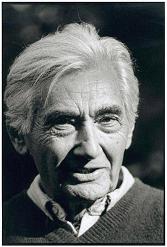A Life Well Lived: Remembering Howard Zinn. People’s Historian

Howard Zinn—historian, radical activist, and teacher—died at the age of 87 on January 27. He was an important thinker who spoke unsettling truths about America —and who joined ideas to action. He will be sadly missed.
Howard Zinn wrote more than 20 books and plays. His most famous and influential work, A People’s History of the United States, has opened the eyes of countless readers to the realities of America’s founding in genocide and slavery and America’s arc of brutal expansion. It has opened the eyes of countless readers to the resistance of the exploited and dominated.
This is history that gives voice to Native Americans, Blacks, women, immigrants, poor laborers, and others whose lives and spirit counted for little in mainstream histories. This is history that tells the story of the Spanish-American War from the side of the Filipinos who fought U.S. colonial conquest.
Howard Zinn stood for a truth-seeking craft of history that challenged the official and self-serving narrative of America—and that challenged people to learn from history, to act on history, to become a force in the struggle for a better world. In this, I was inspired by Howard Zinn; and, as a committed intellectual, I also felt a kinship with him.
He was a very special kind of teacher. In his political memoir You Can’t Be Neutral on a Moving Train, he explained:
“From the start, my teaching was infused with my own history. I would try to be fair to other points of view, but I wanted more than `objectivity’;
I wanted students to leave my classes not just better informed, but more prepared to relinquish the safety of silence, to be prepared to speak up,
to act against injustice wherever they saw it. This of course was a recipe for trouble.”
Howard Zinn did not fear that “trouble.” At Spelman College in Atlanta , where he joined the faculty in 1956 and later served as chairman of the history department, he became involved in the civil rights movement. He was active in the 1960s with the more radical wing of that movement, represented by SNCC (Student Nonviolent Coordinating Committee). He encouraged students to take part in the struggle against segregation—and criticized the campus administration for not doing enough to support that struggle. He was fired.
Howard Zinn was an engaged intellectual who did not shrink from calling out and opposing the crimes of the U.S. empire, even as that carried heavy risk. He acted with principle and integrity…and called on others to do the same.
In the mid-1960s, as the U.S. escalated war in Vietnam , he joined with other progressive and radical intellectuals to go against the tide. He criticized the government and organized against the war. He summoned young people to resist and supported those who did. In the 1980s, he condemned U.S. intervention and U.S.-sponsored terror in Central America . In 1991, he stood against the Persian Gulf War.
In the 2000s, he was a forceful critic and opponent of the Bush regime’s program of war and repression. And in late 2002, as the U.S. readied for war on Iraq , he helped break open resistance in the post-9/11 era as one of the signers of the “Not In Our Name” Statement of Conscience.
For some five decades, Howard Zinn’s engaged scholarship and moral example influenced academics, activists, and new generations of the young.
And it was to the young that he felt a special responsibility. As he said in an interview in this newspaper in 1998: “beneath the surface of `youthful ambition,’ `need to graduate,’ `need to make a career’—beneath that surface, I believe there is always among young people a hunger to do something worthwhile and important.” Even as his health weakened, he continued to speak at high schools and colleges.
I had the privilege of meeting with and sharing in discussions with Howard Zinn. I was struck by a deep knowledge matched by a capacious open-mindedness. I felt Howard’s warmth, his curiosity, and a generosity of spirit. I felt his abiding sense of principle.
Howard Zinn’s passing is a great loss. At a time when intellectual courage and conviction are in short supply, his commitment to expose the lies and confront the injustices of this system stands as a powerful example. His was indeed a life well lived.
Raymond Lotta is a Marxist writer and scholar, and author of the 1984 book, America in Decline

